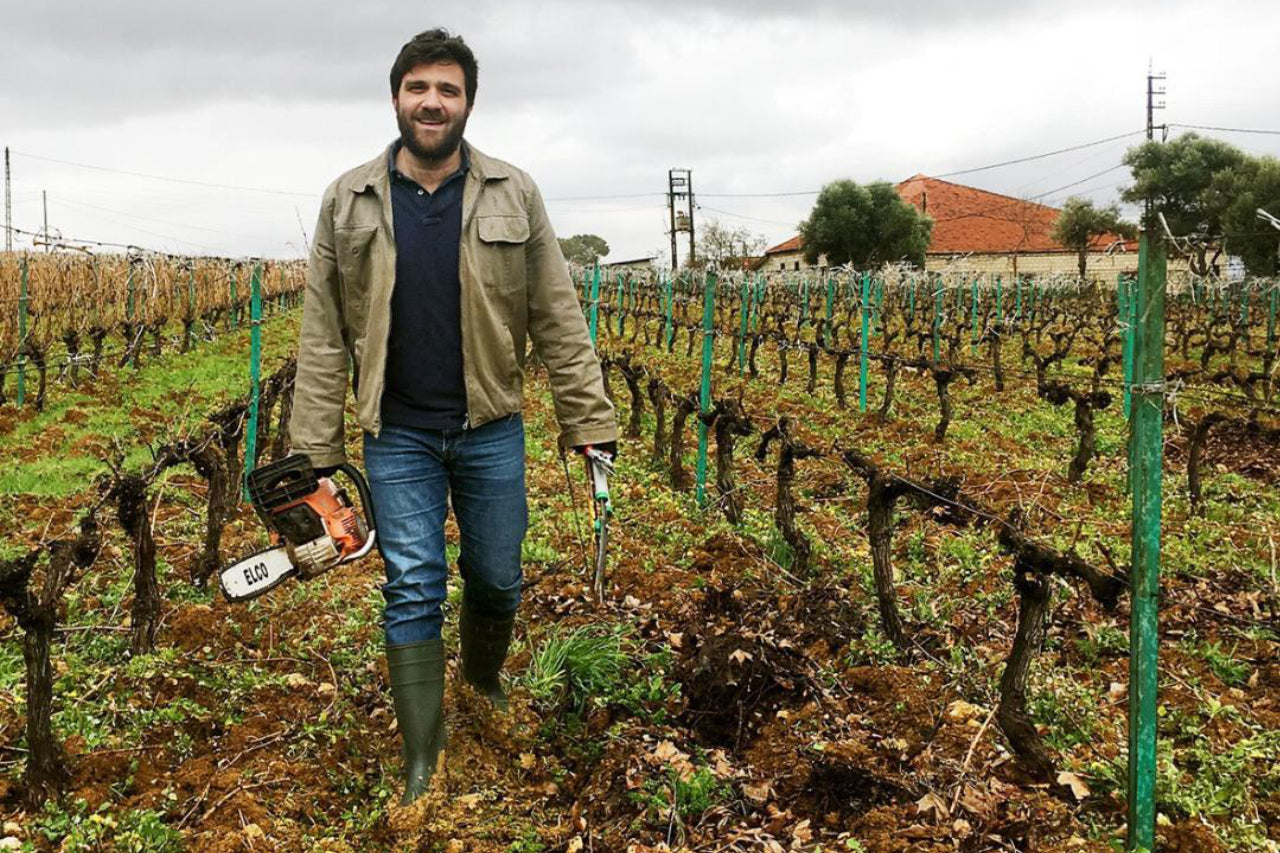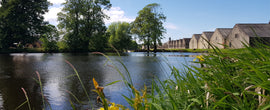DOMAINE des TOURELLES from Lebanon
Founded in 1868 by French ex-pat François-Eugène Brun, Domaine des Tourelles on the western edge of the Bekaa Valley has changed little since its founding. The low-slung buildings topped with red clay tiles have an ageless feel, and behind the cellar doors, you will discover a working museum of 19th-century winemaking technology. The cement tanks used for fermentation and blending are original to the property and have a patina from nearly a century and a half of continual use. An ancient basket press sits in a corner as a reminder of a time when a vigneron was also a carpenter, welder, and machinist, as well as a farmer and artisan. That the estate survived the 20th century without having been completely remodeled and modernized is an absolute miracle, so when vignerons in France and Spain talk about returning to their roots, Domaine des Tourelles has the advantage of never having departed from them. This would all be academic were it not for the passion and vision of winemaker Faouzi Issa. While the estates in France, where he worked as a student, were actively researching and experimenting with incorporating traditional winemaking practices back into their “technical” wines, Faouzi knew he would return to a place that never forgot them. It also gave him the confidence to take what his family had preserved in Bekaa and bring it to the wider world.
Issa’s winemaking philosophy relies on a self-sustained process witnessing minimal intervention and allowing the production of naturally organic and vegan wines. Blessed with an ideal climate for growing grapes, Issa has a simple philosophy of sustainable and manual farming, social responsibility, hand harvesting, indigenous fermentation, minimal SO2, and a preference for neutral oak aging for their red wines. Temperature control for the red wines is entirely passive and based on centuries of knowledge on keeping cool in a hot climate. The byproducts from the fermentations are composted and returned to the soils. These are not only sustainably-made wines, but they are wines of tremendous authenticity, minimally made, and nourishingly Mediterranean.
Since antiquity, the Bekaa valley has been famous for its grapes and wines. While only 30-50km from the Mediterranean coast, the valley is at an average elevation of 1000 meters and surrounded by mountains – Mount Lebanon in the west and the Anti-Lebanon range in the east. Both ranges are composed of limestone, sandstone, and dolomite, which has weathered to form heavy clays in the center of the valley where cereal grains are grown, and poor, gravelly clays on the edges where vines and olive trees thrive. Despite its southern latitude, its elevation ensures warm, dry days and cool nights during summer. In winter, the oak- and cedar-clad mountains are snow-covered, ensuring plenty of groundwater year-round. A testament to this ideal location for making wine, the largest surviving temple to Bacchus still stands in surprisingly good condition at Baalbek in the heart of the Bekaa.
While its roots are ancient, the more recent history of winemaking in the Bekaa can be traced back to the mid-19th-century when commercial winemaking returned to the valley. Many of these early pioneers were either French-born or French-inspired. While some indigenous varieties can still be found, such as Obeidi and Merwah, the Bekaa was largely replanted with Cinsault, Carignan, and Grenache in the 19th century, followed by Chardonnay, Viognier, Cabernet Sauvignon, and Syrah in the 20th. Despite this diverse range of grape varieties, the best-made wines in Bekaa share a common element of balanced rich, ripe fruit and a bright mineral freshness that is a hallmark of the region and its unique terroir. We hope you enjoy these two outstanding examples.
Cheers, The PlumpJack Wine Team
|
Domaine des Tourelles Cinsault |
|
|
Region / Country of Origin: Bekaa Valley, Lebanon |
About the Vineyards: These are some of the highest altitude vineyards in the Northern Hemisphere at 1,050 m above sea level. Benefiting from 240 days of reliable sunshine and the dry climate in the Bekaa where most fungal diseases are not a real threat, all grapes are grown organically. About the winemaking: As a variety, Cinsault is perfectly adapted to heat and drought and in the Bekaa Valley, the conditions are perfect to keep its vigor in check. Hand harvested, it is fermented, undisturbed, with indigenous yeasts in the family’s ancient concrete tanks, then aged in well-seasoned French oak barrels for 8 months. Tasting Notes: Aromas of dried flowers, red fruits such as cherries, raspberries, and strawberries, along with some floral notes and a hint of herbs and spice. Medium bodied and full of character on the palate, the wine is with bright acidity and flavors of red fruit, particularly smoky cherries and cranberries. There are also subtle hints of spice, earthiness, and a touch of minerality. The tannins are smooth and well-integrated, leading to a clean and refreshing finish. Resembles Pinot noir in color and Gamay in taste. |
|
Winemaker: Faouzi Issa |
|
|
Price: $27.99 btl/$302.29 cs |
|
|
Suggested Food Pairing: Escargot with garlic butter, Lamb tagine, Lebanese kibbeh, Shakshuka, Falafel. |
|
|
Domaine des Tourelles Merweh & Obeidi Vieilles Vignes |
|
|
Region / Country of Origin: Bekaa Valley, Lebanon |
About the winemaking: For winemakers in Lebanon, Merweh & Obeidi are the indigenous white varieties of their homeland, both thought to have been originally planted by the Phoenicians. Issa has been searching for old vines of these varieties as a white counterpart to his Cinsault and Carignan old vine cuvées, and 2020 will mark his inaugural vintage of this wine. The Merweh is from 100+-year-old vines located in the Bsarreh mountains in the north of Lebanon, while the Obeidi comes from 50-year-old vines near the capital of Bekaa, Zahleh. Practicing organic. Hand harvested, natural yeast fermentation occurs in stainless steel tanks, then the wine is aged for 3 months in stainless tanks. Tasting Notes: Merweh provides texture and aromas of almonds, while Obeidi contributes floral and herbal aromatics. Fermented separately, they are then blended and aged in stainless steel. This shows a lovely golden color with aromas of apple skins, pear, herbs and spice. The palate is broad and dense with dried figs, almonds and a fresh minerality on the finish. A remarkable wine of great purity and terroir. These grapes have evolved with the landscape so really do reflect their location. |
|
Winemaker: Faouzi Issa |
|
|
Price: $27.99 btl/$302.29 cs |
|
|
Suggested Food Pairing: Chicken Hashweh, Fried Chicken with coleslaw, Tamari almonds, Stuffed grapes leaves with lemon and pepper.
|
|





